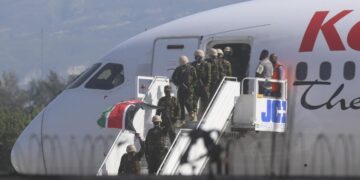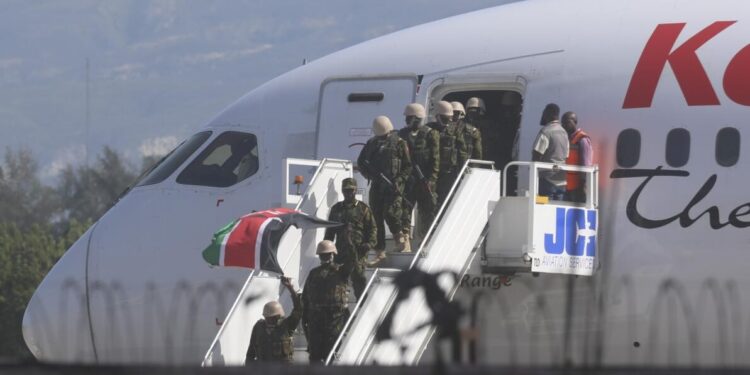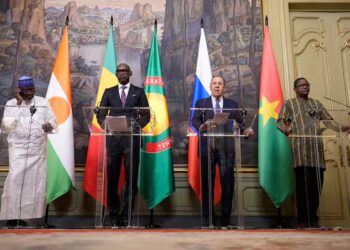By John Ikani
A second wave of 200 Kenyan police officers arrived in Haiti on Tuesday, joining the initial contingent deployed last month. This U.N.-backed mission, led by Kenya, aims to combat the rampant gang violence gripping the Caribbean nation.
The Haitian capital, Port-au-Prince, is largely under the control of gangs, with estimates suggesting at least 80% of the city is under their influence. The United Nations Security Council has condemned the “extreme levels of armed violence” destabilizing Haiti and the surrounding region.
Specific details about the Kenyan officers’ assignments are classified for security reasons. However, they have been spotted patrolling areas near the main international airport, which reopened in May after a forced closure due to gang violence.
Haiti’s newly appointed police chief, Normil Rameau, welcomed the Kenyan contingent, expressing his gratitude for their cooperation.
This mission is expected to expand in the coming months, with officers and soldiers from various nations – Bahamas, Bangladesh, Barbados, Benin, Chad, and Jamaica – contributing to a total force of 2,500 personnel. According to the U.N. Security Council, the deployment will be phased and will cost an estimated $600 million annually.
The primary objective of the mission is to bolster Haiti’s National Police force, which is critically understaffed and underfunded. With only 10,000 active officers for a population exceeding 11 million, the need for reinforcement is clear.
This effort also aims to curb the deadly violence perpetrated by gangs. According to the U.N., these groups were responsible for over 4,450 deaths and 1,668 injuries in 2023 alone, a figure more than double the previous year’s statistics. The first three months of 2024 saw a continuation of this brutality, with over 1,500 people killed or injured.
While some Haitians welcome the arrival of the Kenyan force, others remain skeptical. Analyst Diego Da Rin, from the International Crisis Group, warns that past interventions have only offered temporary relief. He emphasizes the need to address deeper issues like corruption and impunity enjoyed by certain politicians and businesses with gang ties.
Another concern stems from allegations of past human rights abuses by Kenyan police, including extrajudicial killings. Recent protests in Kenya itself saw police fire on demonstrators, raising further questions about their conduct.
Adding to the anxieties is the legacy of the U.N.’s 2004-2017 peacekeeping mission in Haiti. This previous effort was marred by accusations of sexual assault and the introduction of cholera, which tragically claimed nearly 10,000 lives.
Jean-Marc Etienne, a displaced resident forced to flee his home due to gang violence, has yet to witness any tangible improvements on the ground. “Security hasn’t gotten better,” he stated while pushing a sugarcane wheelbarrow near the airport. “Kidnappings are happening again too.” He and his family are currently living under a makeshift tarp with limited protection from the elements.
Gangs have displaced an estimated half a million Haitians in recent years. Mario Jean-Baptiste, another Haitian citizen, echoes the concerns of many. “There’s no real action yet,” he said. “The Haitian people are counting on that.” He describes the dire situation – limited movement within Port-au-Prince, lack of shelter and food – comparing it to the living conditions of “dogs.”
The violence reached a boiling point earlier this year when gangs launched coordinated attacks in late February. Targets included the main airport, police stations, and even major prisons, resulting in the release of over 4,000 inmates. These attacks led to the resignation of former Prime Minister Ariel Henry, who had previously requested foreign intervention in late 2022.
The future of Haiti remains uncertain, but the arrival of Kenyan police marks a new chapter in their fight against gang violence and serves as a desperate plea for stability from the Haitian people.
Whether this international effort will succeed in tackling the root causes of the violence and create lasting peace is yet to be seen.




































